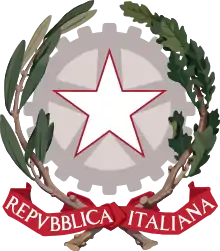Berlusconi IV Cabinet
Berlusconi IV Cabinet was the 60th cabinet of Italy, in office from 8 May 2008 to 16 November 2011.[1] It was the fourth cabinet led by Silvio Berlusconi, who then became the longest-serving Prime Minister of Italy of the Italian Republic (3340 days in office). The cabinet was supported by a coalition between The People of Freedom (PdL) and the Northern League (LN), together with other smaller centre-right parties.
| Berlusconi IV Cabinet | |
|---|---|
60th Cabinet of Italy | |
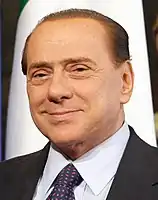 | |
| Date formed | 8 May 2008 |
| Date dissolved | 16 November 2011 (1,288 days) |
| People and organisations | |
| Head of state | Giorgio Napolitano |
| Head of government | Silvio Berlusconi |
| No. of ministers | 25 (incl. Prime Minister) |
| Ministers removed | 5 resigned |
| Total no. of members | 30 (incl. Prime Minister) |
| Member parties | PdL, LN, PT (since March 2011) |
| Status in legislature | Centre-right coalition |
| Opposition parties | PD, IdV, UdC, FLI (since Nov. 2010), MpA (since Nov. 2010) |
| History | |
| Election(s) | 2008 election |
| Legislature term(s) | XVI Legislature (2008–2013) |
| Incoming formation | Berlusconi IV Cabinet formation, 2008 |
| Predecessor | Prodi II Cabinet |
| Successor | Monti Cabinet |
At its formation, the government included 22 ministers and 39 under-secretaries, for a total of 61 members. At the end of its term the cabinet was composed of 24 ministers, 4 deputy ministers and 39 under-secretaries, for a total of 67 members. With 1287 days of tenure, it was second in longevity only to Berlusconi's second government (1409 days from 2001 to 2005) in the history of the Italian Republic.
Formation
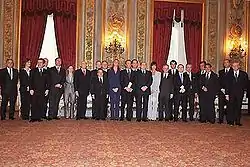
After the sudden fall of the Prodi II Cabinet on 24 January, the break-up of The Union coalition and the subsequent political crisis (which paved the way for a fresh general election on April 2008), Berlusconi, Gianfranco Fini and other party leaders finally agreed on 8 February 2008 to form a joint list named "The People of Freedom" (Italian: Il Popolo della Libertà), allied with the Northern League of Umberto Bossi and with the Sicilian Movement for Autonomy of Raffaele Lombardo.[2]
In the snap parliamentary elections held on 13/14 April 2008 this coalition won against Walter Veltroni's centre-left coalition in both houses of the Italian Parliament.
Berlusconi and his ministers (Berlusconi IV Cabinet) were sworn in on 8 May 2008.
Fall
On 10 October the Chamber of Deputies rejected the law on the budget of the State proposed by the government. As a result of this event Berlusconi moved for a confidence vote in the Chamber on 14 October, he won the vote with just 316 votes to 310, minimum required to retain a majority. An increasing number of Deputies continued to cross the floor and join the opposition and on 8 November the Chamber approved the law on the budget of the State previously rejected but with only 308 votes, while opposition parties didn't participate in the vote to highlight that Berlusconi lost his majority. Among other things, his perceived failure to tackle Italy's debt crisis with an estimated debt sum of €1.9 trillion ($2.6 trillion) has urged Berlusconi to leave office. The popularity of this decision was reflected in the fact that while he was resigning crowds sang the hallelujah portion of George Frederick Handel’s "Messiah", complete with some vocal accompaniment; there was also dancing in the streets outside the Quirinal Palace, the official residence of the President of Italy, where Berlusconi went to tender his resignation.
The austerity package was passed, it will raise €59.8 billion in savings from spending cuts and tax raises, including freezing public-sector salaries until 2014 and gradually increasing the retirement age for women in the private sector from 60 in 2014 to 65 in 2026. The resignation also came at a difficult time for Berlusconi, as he was involved in numerous trials for corruption, fraud and sex offences. He was often found guilty in lower courts but used loopholes in Italy's legal system to evade incarceration.
Berlusconi had also failed to meet some of his pre-election promises and had failed to prevent economic decline and introduce serious reforms. Many believed that the problems and doubts over Berlusconi's leadership and his coalition were one of the factors that contributed to market anxieties over an imminent Italian financial disaster, which could have a potentially catastrophic effect on the 17-nation eurozone and the world economy. Many critics of Berlusconi accused him of using his power primarily to protect his own business ventures. Umberto Bossi, leader of the Northern League, a partner in Berlusconi's right-wing coalition, was quoted as informing reporters outside parliament, "We asked the prime minister to step aside."
CNN reported on 7 November that Berlusconi had previously denied the rumors that he was going to resign and had stated on his Facebook page that "The rumors of my resignation are groundless." On 12 November 2011, after a final meeting with his cabinet, Berlusconi met Italian president Giorgio Napolitano at the Quirinal Palace to tender his resignation. He announced this to the Italian public by telephone on one of his television channels. Italian news agency ANSA reported that Berlusconi had remarked to his aides that "This is something that deeply saddens me". Berlusconi conceded that he had lost his parliamentary majority and concluded that "things like who leads or who doesn't lead the government was less important than doing what is right for the country." Berlusconi issued a statement that he would not stand for office in Italy again after the budget defeat. In his resignation he was said to have also mentioned "eight traitors", former allies who had abstained.
Investiture votes
Investiture votes for Berlusconi IV Cabinet | |||
|---|---|---|---|
| House of Parliament | Vote | Parties | Votes |
| Chamber of Deputies | PdL, LN, MpA | 335 / 611 | |
| PD, UdC, IdV, SVP–ALD, Others | 275 / 611 | ||
| Abstention | Others | 1 / 611 | |
| Senate of the Republic | PdL, LN, MpA | 173 / 322 | |
| PD, IdV, UdC–SVP–AUT, Others | 137 / 312 | ||
| Abstention | Others | 2 / 312 | |
Party breakdown
Ministers
12 | |
4 | |
4 | |
1 |
Ministers and other members
- The People of Freedom (PdL): Prime minister, 17 ministers, 30 undersecretaries
- Forza Italia (FI): Prime minister, 12 ministers, 17 undersecretaries
- National Alliance (AN): 4 ministers, 8 undersecretaries
- Christian Democracy for the Autonomies (DCA): 1 minister
- Liberal Populars (PL): 1 undersecretary
- Independents: 4 undersecretaries
- Northern League (LN): 4 ministers, 5 undersecretaries
- Movement for Autonomy (MpA): 2 undersecretaries
- Christian Democracy (DC): 1 undersecretary
- Independents: 1 undersecretary
Ministers
19 | |
3 | |
1 | |
1 |
Ministers and other members
- The People of Freedom (PdL): Prime minister, 18 ministers, 24 undersecretaries
- Northern League (LN): 3 ministers, 1 deputy minister, 4 undersecretaries
- People and Territory (PT): 1 minister, 1 deputy minister, 2 undersecretaries
- The Populars of Italy Tomorrow (PID): 1 minister
- Popular Action (AP): 1 deputy minister
- Movement of National Responsibility (MRN): 1 undersecretary
- La Discussione: 1 undersecretary
- Independents: 1 minister, 2 undersecretaries
- Republicans-Actionists (RA): 1 deputy minister
- Great South (GS): 2 undersecretaries
- Christian Democracy (DC): 1 undersecretary
- The Right (Destra): 1 undersecretary
- National Cohesion (CN): 1 undersecretary
Council of Ministers
Composition of the Government
| Portrait | Office | Name | Term | Party | Deputy Ministers Undersecretaries | |
|---|---|---|---|---|---|---|
_cropped.jpg.webp) |
Undersecretaries: Gianni Letta (Ind.)[lower-alpha 1] Paolo Bonaiuti (PdL)[lower-alpha 2] Carlo Giovanardi (PdL)[lower-alpha 3] Gianfranco Micciché (GS)[lower-alpha 4][lower-alpha 5] Rocco Crimi (PdL)[lower-alpha 6] Michela Vittoria Brambilla (PdL)[lower-alpha 7] (until 8 May 2009) Guido Bertolaso (Ind.)[lower-alpha 8] (until 11 November 2010) | |||||
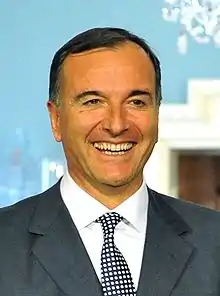 |
Undersecretaries: Stefania Craxi (PdL) Alfredo Mantica (PdL) Vincenzo Scotti (NS)[lower-alpha 9] (until 7 November 2011) | |||||
 |
Undersecretaries: Alfredo Mantovano (PdL) Michelino Davico (LN) Nitto Francesco Palma (PdL) (until 27 July 2011) Sonia Viale (LN) (since 5 May 2011) Guido Viceconte (PdL) (since 14 October 2011) | |||||
 |
Undersecretaries: Elisabetta Casellati (PdL) Giacomo Caliendo (PdL) | |||||
 |
||||||
 |
Undersecretaries: Guido Crosetto (PdL) Giuseppe Cossiga (PdL) | |||||
.jpg.webp) |
Deputy Ministers: Giuseppe Vegas (PdL)[lower-alpha 10] (21 May 2009 – 15 December 2010) Undersecretaries: Luigi Casero (PdL) Alberto Giorgetti (PdL) Daniele Molgora (LN) (until 20 May 2010) Nicola Cosentino (PdL) (until 15 July 2010) Sonia Viale (LN) (20 May 2010 – 5 May 2011) Bruno Cesario (PT) (since 5 May 2011) Antonio Gentile (PdL) (since 5 May 2011) | |||||
 |
Deputy Ministers: Adolfo Urso (FLI)[lower-alpha 11][lower-alpha 12] (30 June 2009 – 17 November 2010) Paolo Romani (PdL)[lower-alpha 12] (30 June 2009 – 4 October 2010) Catia Polidori (PT)[lower-alpha 13] (14 Oct 2011 – 16 November 2011) Undersecretaries: Ugo Martinat (PdL) (until 28 March 2009) Stefano Saglia (PdL) (since 30 April 2009) Daniela Melchiorre (LD) (5 May 2011 – 27 May 2011) | |||||
 |
(ad interim) |
|||||
 |
||||||
 |
Undersecretaries: Antonio Buonfiglio (FLI)[lower-alpha 11] (until 17 November 2010) Roberto Rosso (PdL) (since 5 May 2011) | |||||
 |
||||||
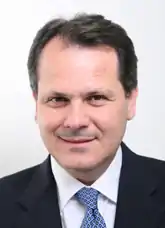 |
||||||
.jpg.webp) |
Undersecretaries: Roberto Menia (FLI)[lower-alpha 11] (until 17 November 2010) Giampiero Catone (PT) (since 5 May 2011) Elio Vittorio Belcastro (GS)[lower-alpha 14] (since 28 July 2011) | |||||
 |
Deputy Ministers: Roberto Castelli (LN)[lower-alpha 10] (21 May 2009 – 16 November 2011) Aurelio Misiti (RA)[lower-alpha 13] (14 Oct 2011 – 16 November 2011) Undersecretaries: Bartolomeo Giachino (Ind.) Mario Mantovani (PdL) Giuseppe Maria Reina (MpA) (until 17 November 2010) | |||||
 |
Deputy Ministers: Ferruccio Fazio (Ind.)[lower-alpha 10] (21 May 2009 – 14 December 2009) Undersecretaries: Francesca Martini (LN) (until 4 February 2010) Eugenia Roccella (PdL) (until 4 February 2010) Pasquale Viespoli (FLI)[lower-alpha 11] (until 8 October 2010) Nello Musumeci (Destra) (since 15 April 2011) Luca Bellotti (PdL) (since 5 May 2011) | |||||
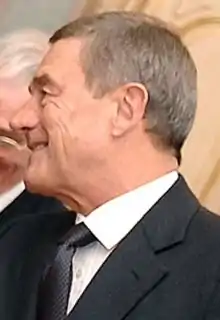 |
Undersecretaries: Francesca Martini (LN) (since 4 February 2010) Eugenia Roccella (PdL) (since 4 February 2010) | |||||
 |
Undersecretaries: Giuseppe Pizza (DC) Guido Viceconte (PdL) (5 May 2011 – 14 October 2011) Giuseppe Galati (PdL) (since 14 October 2011) | |||||
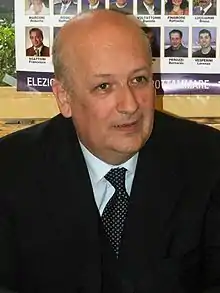 |
Undersecretaries: Francesco Giro (PdL) Riccardo Villari (CN) (since 5 May 2011) | |||||
 |
||||||
 |
(without portfolio) |
|||||
 |
(without portfolio) |
Undersecretaries: Daniela Santanchè (PdL) (since 4 March 2010) | ||||
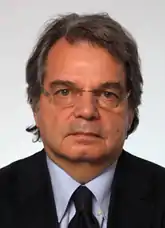 |
(without portfolio) |
Undersecretaries: Andrea Augello (PdL) (since 4 March 2010) | ||||
 |
(without portfolio) |
|||||
.JPG.webp) |
(without portfolio) |
before 30 July 2010: The People of Freedom |
||||
 |
||||||
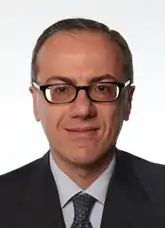 |
(without portfolio) |
Undersecretaries: Laura Ravetto (PdL) (since 4 March 2010) | ||||
 |
(without portfolio) |
Undersecretaries: Aldo Brancher (PdL) (until 18 June 2010) | ||||
 |
(without portfolio) |
|||||
 |
(without portfolio) |
Undersecretaries: Maurizio Balocchi (LN) (until 14 February 2010) Francesco Belsito (LN) (since 22 February 2010) | ||||
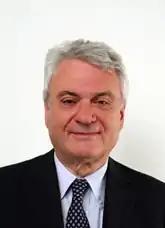 |
(without portfolio) |
|||||
 |
(without portfolio) |
|||||
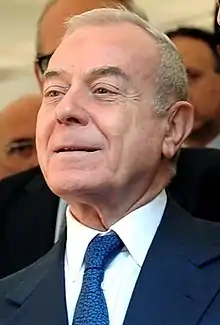 |
— | |||||
- With delegation to the secret services
- With delegation to information, communications and publishing.
- With delegation to family policies, the fight against drugs, and the civil service.
- before 30 October 2010: PdL
- With delegation to the CIPE (Inter-ministerial Committee for Economic Planning).
- With delegation to sport.
- With delegation to tourism.
- With delegation to the solution of the waste management crisis in Campania and to the coordination of Civil Protection to a European and international level.
- before 22 January 2010: MpA
- Undersecretary until 21 May 2009
- before 30 July 2010: PdL
- Undersecretary from 8 May 2008 to 30 June 2009
- Undersecretary until 14 October 2011
- before 7 November 2011: PT
References
- "Governo Berlusconi IV". www.governo.it (in Italian). 11 November 2015. Retrieved 15 October 2019.
- "Svolta di Berlusconi, arriva il Pdl: "Forza Italia-An sotto stesso simbolo"" (in Italian). La Stampa. 8 February 2008. Archived from the original on 29 October 2013.
